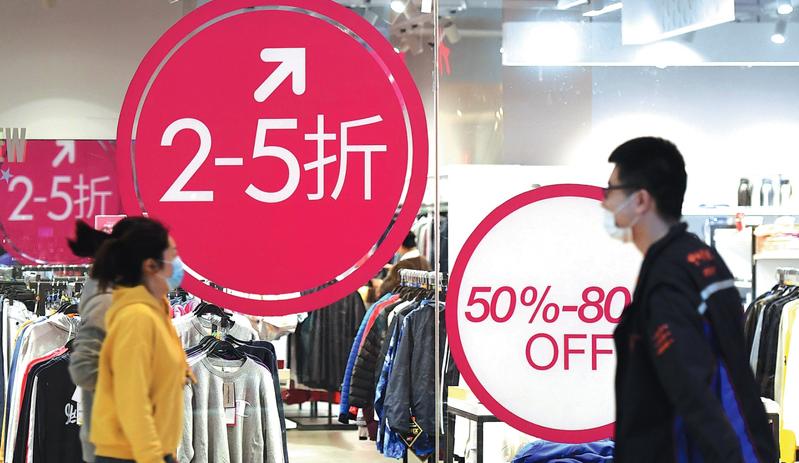The pandemic has led young Chinese to manage their money better, Chen Meiling reports.
 Stores in Chongqing try to attract customers with discounts as they resume business in early April. (CHEN CHAO / CHINA NEWS SERVICE)
Stores in Chongqing try to attract customers with discounts as they resume business in early April. (CHEN CHAO / CHINA NEWS SERVICE)
China has been educating its next generation to prepare for unexpected events or potential risks. And it seems there is no curriculum more cogent than the reality that reflects the old saying, "Bring an umbrella on a sunny day; save food when you are full."
With millions affected financially by the COVID-19 pandemic as a result of unpaid leave, furloughs or layoffs, many have shifted toward low-cost, high-value purchases during such tough times.
Young Chinese consumers, including those born after 1990, a generation often considered to have untapped spending power, have learned to become more cautious about opening their wallets.
Ma Tianhui, 21, a college student who studies advertising in Beijing, says she saves the money she previously spent on dining, outings and shopping since she stays home.
She previously often spent all of her 2,000 (US$282) in monthly pocket money.
However, the gloomy headlines about layoffs and unemployment have got Ma's attention.
Ma says she plans to rent a house and work in Beijing after her graduation next year. "The pandemic made me think about the future and what kind of life I want to live as an independent adult."
She says she has learned to be careful about each expenditure. She has also taken up two remote internships-data analysis and new media operation-using most of her spare time after online courses to earn money and develop occupational skills.
The impact of the coronavirus outbreak is more obvious on consumer behavior among those already struggling in the labor market.
Liu Yifan, who's in her 30s, runs a company as an interactive-installation designer in Shanghai. She says her consumption has significantly decreased due to restrictions on entertainment activities, and fear of being infected during trips or outings.
"Besides, my income also fell as many of our clients, such as design and planning companies, have postponed or canceled business this year. I suppose we will stay idle for at least two months. This summer will not be easy," she adds.
Liu is a layperson in wealth management. She says she has to try harder to contact clients to make more money, but she thinks it's understandable that online courses about finance have sprung up.
Yun Xin, 26, an analyst at a communications company in Beijing, says her previous spending on clothes, cosmetics and entertainment has been cut, and she is more willing to pay for health and self-improvement.
Yun can only get 85 percent of her wages because of the pandemic. The company promised to return the remaining 15 percent to employees at the end of the year.
Yun would invest half of her monthly salary in low-risk financial products, because "the bank interest is low".
She says she is thinking about buying houses and other value-preserved or value-added commodities, and taking more side jobs to expand her income sources.
"Saving is of great importance to me. I'm the only child in the family. My parents are in poor health. I have to save more money to confront possible changes in my life," she adds.
Li Xuecan, a 25-year-old government worker in a county in Hebei province, routinely puts half to two-thirds of his salary into fixed deposits since he began to work.
He also buys financial products on Alibaba's financial-service platform, Alipay.
 A customer pays with her cellphone in a restaurant in Shenyang, Liaoning province, in early April. (MU ZI / FOR CHINA DAILY)
A customer pays with her cellphone in a restaurant in Shenyang, Liaoning province, in early April. (MU ZI / FOR CHINA DAILY)
He barely spends money as he lives with his parents and eats at his office canteen, and only buys books from time to time, an expenditure that was also cut because he was too busy dealing with his office work at the peak of the outbreak.
He says his savings are for better things-marriage and housing.
"You don't have to experience difficult times to know the meaning of wealth," he says, referring to a way of thinking of the post-1990 generation, who grew up in a comparatively wealthy era, as "extravagant" or "unrealistic".
"Money brings a sense of security and the freedom to realize my ideas," Li says, adding that his future targets include having at least 300,000 yuan in savings before age 30 and buying his second house before 35.
In the first quarter of the year, bank savings nationwide increased by 6.47 trillion yuan, 400 billion yuan more than the growth in the same period last year, data from the People's Bank of China, the country's central bank, shows. It means more than 70 billion yuan were put into banks every day on average from January to March.
According to a survey released by the bank in late April, 22 percent of urban residents tended to "increase consumption" in the first quarter, down 6 percentage points quarter-on-quarter; 53 percent preferred "saving more", up 7.3 percentage points; and 25 percent preferred to make "more investments", down 1.3 percentage points.
In contrast, the total retail sales of consumer goods dropped 13.5 percent year-on-year to reach over 13.87 trillion yuan from January to May, according to the National Bureau of Statistics, although the figure rebounded in a month-on-month context.
Zhao Haoxing, a professor at Zhejiang Gongshang University, says a reason for the decline in consumption and growing willingness to save is that the public is worried about the future-how the pandemic will progress globally and domestically, affecting society and the economy, especially jobs and incomes.
"It's more a protective response that people will have in a time with much uncertainty," Zhao says.
"Before, only elderly people had the habit of setting aside money. Now the youth are following."
Benoit Garbe, senior partner at the consultancy Prophet, says consumers who have the spending power will reassess their definition of "premium", seeking more pragmatic, tangible superiority in brands they purchase and place greater value on responsible buying.
Young shoppers are learning to offload used possessions and embracing a more sustainable attitude, he says, adding that Chinese social media also saw the rise of "ditch your stuff" initiatives, and secondhand or flea-market apps.
Douban, a social media platform that many youngsters use, recorded a growing number of discussions around topics like "reduce consumption", "minimalist life", "saving money" or "don't buy clothes for 100 days".
While these discussions on social media might have started as a sign of lifestyle changes, and as it became clearer that the economic recovery might take longer than expected, young people have started to realize that they might have to go through more hardship, and that the virtue of saving might come handy to face the new reality, says Alain Lecouedic, partner at the consultancy Roland Berger.
Consumption has become a major driving force of the Chinese economy and contributed 57.8 percent to the country's GDP growth last year.
If the "retaliatory saving" trend continues or amplifies, consumption will not lift the GDP as strongly as anticipated, he says.
While such sectors as retail consumption, travel and hospitality have been hit hard by the outbreak, some sectors such as online games, videos, music and livestreaming have benefited, Lecouedic adds.
A report by Chinese tech company Tencent in December found that Chinese born after 1990 had a strong sense of money management.
About 84 percent of the young interviewees said they had a habit of managing money, and that the more they spent on finance, the stronger their sense of happiness was.
Lecouedic suggests Chinese youth should be financially conservative on spending and investment to preserve and protect cash and create reserves.
It may be a thing of the past for young people who are already employed to switch jobs frequently to get better packages, and securing their existing positions and income sources may be wiser, he says.
Contact the writer at chenmeiling@chinadaily.com.cn


